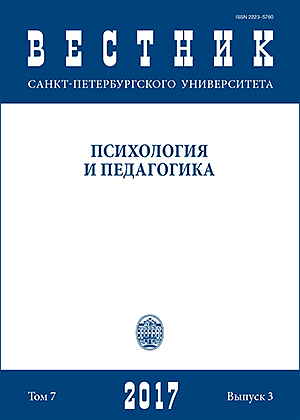Исследование эксплицитных и имплицитных представлений о любопытстве
DOI:
https://doi.org/10.21638/11701/spbu16.2017.304Аннотация
Любопытство часто определяют как движущую силу развития и обучения, обусловленную внутренней мотивацией. В связи с этим важно представление самого человека о любопытстве. Цель работы — выявить собирательное представление о любопытстве во всем разнообразии его характеристик. Для этого мы предлагали респондентам два задания: назвать признаки понятия «любопытство» и создать метафорическое сравнение для него. Выборка состояла из 45 человек в возрасте от 18 до 28 лет (M=20,14), все студенты СПбГУ. Респонденты описывают любопытство как нечто спонтанное, связанное с поиском новой информации. Проявления любопытства часто ассоциируется с препятствиями, которыми являются социальные правила и труднодоступность самого объекта любопытства. С одной стороны, любопытство ассоциируется с познавательными процессами, в частности со зрительным восприятием, с другой стороны, данные показали, что для студентов проявлять любопытство — это значит быть ребенком, нетактичным, наивным. Обсуждаются возможные последствия такого представления для процесса обучения. Выявлено расхождение эксплицитных и имплицитных представлений о любопытстве. Эксплицитные представления о любопытстве характеризуются большей шаблонностью: любопытство некорректно проявлять, но оно переживается как приятное эмоциональное состояние, заинтересованность и активность при взаимодействии с миром. Имплицитно любопытство представляется как более неконтролируемое, но способное привести к получению обычно недоступной, спрятанной информации.
Ключевые слова:
любопытство, метафорическое сравнение, представление о любопытстве
Скачивания
Библиографические ссылки
Загрузки
Опубликован
Как цитировать
Выпуск
Раздел
Лицензия
Статьи журнала «Вестник Санкт-Петербургского университета. Психология» находятся в открытом доступе и распространяются в соответствии с условиями Лицензионного Договора с Санкт-Петербургским государственным университетом, который бесплатно предоставляет авторам неограниченное распространение и самостоятельное архивирование.




